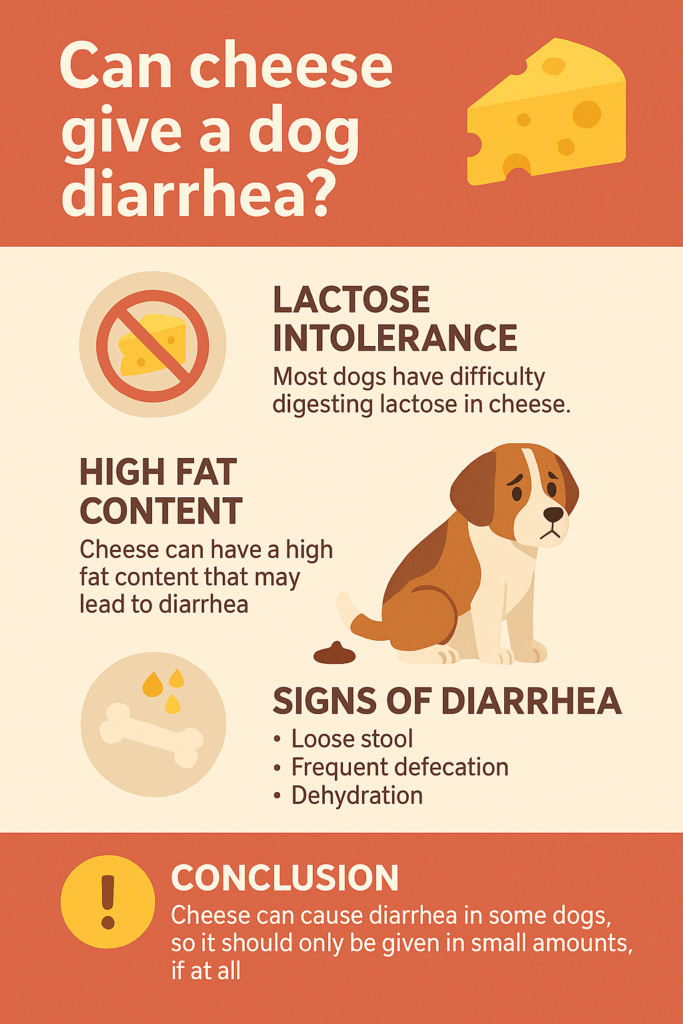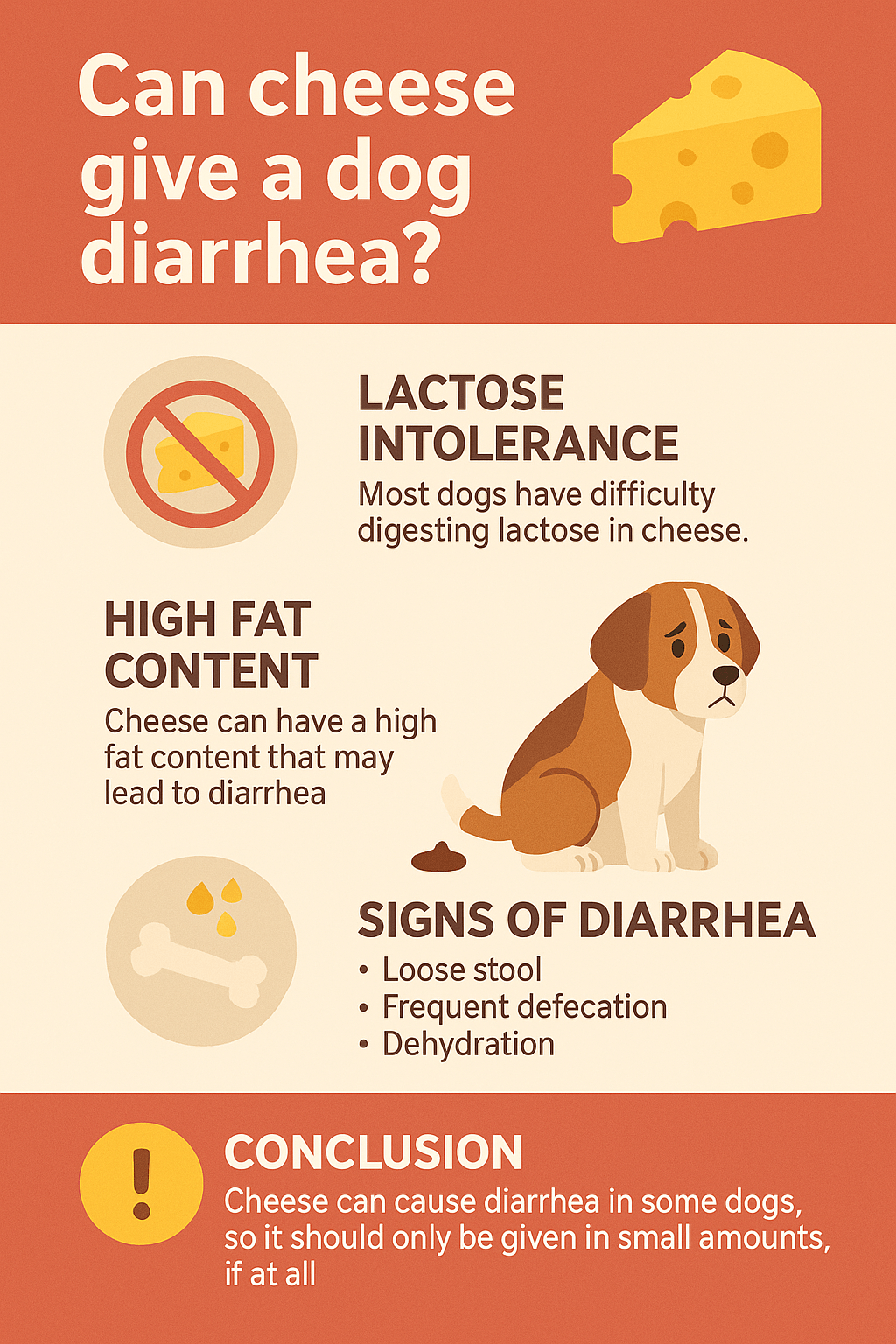Can Cheese Give a Dog Diarrhea?
Cheese is often considered a tasty treat for dogs, but can it also lead to digestive issues like diarrhea? While many dogs enjoy the rich flavor of cheese, their bodies may not always handle it well. Factors such as lactose intolerance, portion size, and individual sensitivities play a significant role in determining whether cheese is safe for your furry friend. Understanding these factors can help you make informed decisions about feeding cheese to your dog and prevent potential health problems. Let’s explore the relationship between cheese and canine digestion to ensure your pup stays happy and healthy.
Expert Insight: Cheese and Dogs
“Dogs can handle small amounts of cheese before having possible reactions to it, such as diarrhea or other digestive disturbances. Too much of a good thing—even their favorite thing—may give them tummy problems.”
Why Cheese Can Cause Digestive Issues in Dogs
Cheese isn’t inherently toxic to dogs, but certain components can upset their digestive systems. Here are some reasons why cheese might lead to diarrhea or other gastrointestinal problems.
Lactose Intolerance:
Many adult dogs lack sufficient lactase, the enzyme needed to digest lactose found in cheese. This can result in bloating, gas, and diarrhea.High Fat Content:
Cheese is often high in fat, which can overwhelm a dog’s digestive system, especially if consumed in large amounts.Overfeeding:
Even small portions of cheese can cause issues if given too frequently or in combination with other rich foods.Individual Sensitivities:
Some dogs have unique allergies or intolerances to dairy products, making them more prone to adverse reactions.Additives and Seasonings:
Processed cheeses may contain salt, spices, or artificial ingredients that irritate a dog’s stomach.
Understanding these factors helps pet owners recognize why cheese might not be suitable for every dog and how to avoid potential problems.

Signs Your Dog May Be Sensitive to Cheese
If your dog has eaten cheese and is experiencing digestive distress, there are specific symptoms to watch for. These signs indicate that your dog may not tolerate cheese well.
Loose Stools or Diarrhea:
Diarrhea is one of the most common signs of lactose intolerance or an upset stomach after eating cheese.Vomiting:
Some dogs may vomit shortly after consuming cheese, signaling an inability to process it effectively.Excessive Gas:
Increased flatulence is a typical reaction to lactose intolerance and can accompany other digestive symptoms.Abdominal Pain:
Dogs with stomach discomfort may exhibit restlessness, whining, or reluctance to move due to cramping or bloating.Loss of Appetite:
A dog feeling unwell from eating cheese may refuse food or show disinterest in meals temporarily.
Recognizing these symptoms early allows you to address any issues promptly and adjust your dog’s diet accordingly.
Check this guide 👉Can Dogs Eat Strawberry Cream Cheese? Best 7 Expert Tips!
Check this guide 👉Can Dogs Eat Cheesecake? Best 7 Expert Tips!
Check this guide 👉Can Dogs Eat Asiago Cheese? Best 7 Expert Tips!
Safe Alternatives to Cheese | Foods to Avoid Giving Dogs |
|---|---|
Plain cooked chicken (unseasoned) | Chocolate |
Carrots (raw or steamed) | Grapes and raisins |
Plain yogurt (low-lactose options) | Onions and garlic |
Apples (without seeds) | Alcohol |
Blueberries | Macadamia nuts |
How to Safely Feed Cheese to Your Dog
If you decide to give your dog cheese as an occasional treat, it’s important to do so responsibly. Follow these tips to minimize the risk of digestive upset.
Choose Low-Lactose Options:
Opt for cheeses like cheddar or Swiss, which tend to have lower lactose levels compared to soft cheeses like brie or cream cheese.Start with Small Portions:
Begin with a tiny piece to see how your dog reacts before offering larger amounts.Monitor for Reactions:
Observe your dog closely for any signs of digestive distress within 12-24 hours of giving cheese.Use Cheese as a Training Reward:
Incorporate small bits of cheese into training sessions rather than using it as a regular snack.Avoid Processed Varieties:
Steer clear of flavored or processed cheeses that contain added sugars, salts, or preservatives.
By following these guidelines, you can safely incorporate cheese into your dog’s diet without compromising their health.
Steps to Take If Cheese Causes Diarrhea
If your dog develops diarrhea after eating cheese, quick action can help alleviate their discomfort and prevent further complications.
Withhold Food Temporarily:
Fasting your dog for 12-24 hours gives their digestive system time to recover. Ensure they have access to fresh water to prevent dehydration.Offer Bland Meals:
Once fasting is complete, feed bland foods like boiled chicken and rice to soothe their stomach.Reintroduce Water Gradually:
Provide small sips of water at first to rehydrate your dog without overwhelming their system.Consult a Veterinarian:
Persistent diarrhea or additional symptoms like lethargy or vomiting warrant a visit to the vet.Adjust Their Diet Moving Forward:
Eliminate problematic foods like cheese and focus on easily digestible, dog-friendly alternatives.
Taking these steps ensures your dog recovers quickly and avoids similar issues in the future.
Common Misconceptions About Feeding Cheese to Dogs
There are several myths surrounding feeding cheese to dogs. Clarifying these misconceptions helps pet owners make better dietary choices for their pets.
Myth: All Dogs Love Cheese:
While many dogs enjoy cheese, some may dislike it or have trouble digesting it.Myth: Cheese Is Always Safe in Moderation:
Even small amounts can cause issues for lactose-intolerant or sensitive dogs.Myth: Soft Cheeses Are Better for Dogs:
Soft cheeses like cream cheese often contain higher lactose levels, making them less ideal for dogs.Myth: Cheese Prevents Garlic Toxicity:
Contrary to popular belief, cheese does not counteract the harmful effects of garlic or onions in a dog’s system.Myth: Cheese Is Nutritious for Dogs:
While cheese contains calcium and protein, it lacks essential nutrients dogs need and should not replace balanced meals.
Separating fact from fiction empowers pet owners to make smarter decisions about their dog’s diet.
Benefits of Using Cheese as a Training Tool
When used responsibly, cheese can serve as an effective training aid for dogs. Its strong smell and taste make it highly motivating during learning sessions.
High Motivation Factor:
The rich flavor of cheese captures a dog’s attention, making it easier to reinforce positive behaviors.Quick Consumption:
Unlike chewy treats, cheese is easy for dogs to swallow quickly, keeping training sessions efficient.Customizable Portions:
You can cut cheese into tiny pieces, ensuring calorie control while maximizing motivation.Versatility in Training Scenarios:
Cheese works well in various environments, from obedience classes to outdoor adventures.Encourages Focus During Distractions:
The enticing aroma of cheese helps redirect a dog’s focus back to the task at hand.
Using cheese wisely enhances training outcomes while maintaining your dog’s enthusiasm.
Alternatives to Cheese for Lactose-Intolerant Dogs
If your dog struggles with cheese or dairy, there are plenty of alternative treats that are equally delicious and nutritious.
Peanut Butter (Xylitol-Free):
Natural peanut butter is a great option for dogs who love creamy textures.Frozen Yogurt Drops:
Low-lactose frozen yogurt provides a refreshing and satisfying treat for hot days.Cooked Sweet Potatoes:
Rich in fiber and vitamins, sweet potatoes are a wholesome substitute for cheese.Pumpkin Puree:
Canned pumpkin aids digestion and makes a tasty reward for good behavior.Dehydrated Meat Snacks:
Beef or chicken jerky offers protein-packed treats without dairy concerns.
Exploring these alternatives ensures your dog enjoys variety in their treats without risking digestive issues.
Frequently Asked Questions About Feeding Cheese to Dogs
Is all cheese bad for dogs?
Not necessarily. Some cheeses, like cheddar or mozzarella, are safer in moderation, while others, like blue cheese, should be avoided entirely.
What should I do if my dog accidentally eats a lot of cheese?
Monitor them closely for symptoms of digestive upset. Contact your vet if they show signs of illness.
Can puppies eat cheese?
Puppies are more likely to experience digestive issues from cheese due to their developing digestive systems. Proceed with caution.
Are there lactose-free cheese options for dogs?
Yes, lactose-free cheese is available and may be a better option for dogs with lactose intolerance.
How much cheese is too much for a dog?
Treats, including cheese, should make up no more than 10% of a dog’s daily caloric intake to prevent obesity and digestive issues.
Balancing Treats and Health for Your Dog
While cheese can be an enjoyable treat for many dogs, it’s crucial to consider its potential impact on their digestive health. By understanding your dog’s individual tolerance, choosing appropriate types of cheese, and limiting portion sizes, you can safely include this snack in their diet. Always prioritize your dog’s overall well-being and consult your veterinarian if you’re unsure about introducing new foods. With careful attention and responsible feeding practices, you can keep your pup both happy and healthy.
Do Cats Have Taste Buds? Best 7 Expert Tips! – Discover how cats experience flavors and why their taste is so unique.
Do Dogs Have Taste Buds? Best 7 Expert Tips! – Discover how dogs experience taste, their preferences, and what it means for their diet and health.
Can Cats Taste Sweet? Best 7 Expert Tips! – Discover why cats can’t taste sweetness, how it affects their diet, and tips to keep them healthy and happy.
Can Dogs Taste Sweet? Best 7 Expert Tips! – Discover how dogs perceive sweetness, which foods are safe, and tips to manage their sweet cravings responsibly.





